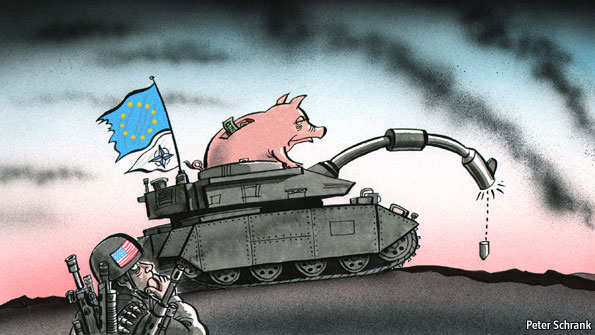
From Peter Apps, Reuters: The European Union might appear a military superpower, at least on paper. It has more uniformed personnel than the United States and overall EU defense spending outstrips Russia or China.
But as Washington pulls troops back from the continent, two decades after the Cold War ended, and refocuses on Asia, the cash-strapped nations of Europe face uncomfortable truths over just how paltry their real military capabilities have become.
NATO’s war in Libya last year was trumpeted as Europe starting to take responsibility for its own backyard, with Britain and France calling the shots while Washington "led from behind." In reality, the campaign was heavily dependent on U.S. military, technical, intelligence and logistical support – the Europeans could not even supply enough of their own munitions.
According to one security source, of more than 100 cruise missiles fired during the opening days of the campaign, only two were European, and even those were built in the United States -Tomahawks, fired from a British nuclear submarine.
For strategists in Washington focused on the need to cut some half a trillion dollars from their defense budget, Europe offers few threats and even fewer opportunities. This much has become clear in last week’s announced U.S. strategy shift.
"SWITZERLAND WRIT LARGE"
While several European states provided at least a token military presence in support of the U.S. war in Afghanistan, they would be able to offer much less in the way of useful capabilities in any stand-off with China, Iran or North Korea.
In what some are calling the "Asian century," even the "special relationship" between the United States and its 20th-century Atlantic ally Britain looks much less relevant.
"The new U.S. strategy underlines the growing divergence between European and American strategic interests," said Nick Witney, a former head of the European Defense Agency and now a senior fellow at the European Council on Foreign Relations.
"Europe is going to have to grow up and learn to take responsibility for its own security, without Uncle Sam to prod and cajole – or, more likely, decline into a strategic backwater… Switzerland writ large. . . ."
According to data from the Stockholm International Peace Research Institute, total defense spending across Europe fell by 2.8 percent in 2010 as the financial crisis began to bite. A similar fall is expected to be recorded for 2011.
But Europe’s defense weakness is clearly not just a matter of money or even personnel.
France, Britain, Germany and Italy remain in the top 10 global defense spenders. Total estimates of European Union defense and security spending vary between $200 and 300 billion, depending on what is included. That might be well under half that of the United States, but by some assessments it still outstrips both Russia and China combined.
China’s official 2011 military budget was some $91 billion, although many analysts suspect the real figure could be much higher. Russia’s 2011 defense budget was $53 billion.
According to the European Defense Agency and the International Institute for Strategic Studies, in 2010 Europe had some 1.6 million full-time military personnel and as many as 5 million including reserve and paramilitary personnel — more than the United States, the global military superpower.
The problem, critics say, is that Europe spends that cash and uses those personnel in an almost uniquely inefficient way. . . .
Many of Europe’s individual states, defense experts say, continue to use the sector as a way of bolstering national industry and employment rather than building true military capability that would be of use internationally.
Attempts at cooperation among European governments frequently flounder, with critics blaming mismanagement and political interference. Projects such as the British-German-Italian-Spanish Eurofighter or the A400M military transport aircraft ran billions over budget and suffered years of delays.
There have been attempts to solve the problem. In 2004, the European Union set up the European Defense Agency largely to provide coordination and avoid such issues. Critics say it has known mixed success at best, although supporters hope the U.S. drawdown could provide just the impetus it needs to thrive.
"What we are being told to do now is that we have to do our job," EDA chief executive Claude-France Arnould told Reuters. "We should go full speed ahead with pooling and sharing."
But solving those technical issues of policy coordination would only be a beginning. Most of the continent’s military personnel, many analysts say, are effectively undeployable. (graphic: Peter Schrank/Economist)
Image: economist%206%2018%2011%20Europe%20military%20failings.jpg
